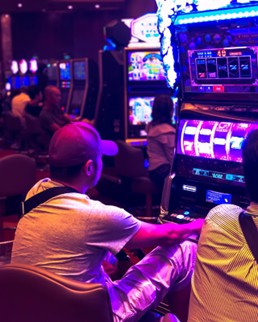
Gambling can be an exhilarating and exciting activity, whether you're at a casino, or using online platforms. However, like many other activities that involve money and personal stakes, it’s crucial to consider security and privacy. With the growing use of technology and digital platforms, the risk of exposing personal information has never been higher.
Protecting your personal and financial information is essential. From credit card details to your identity, sensitive data can be vulnerable if you aren’t vigilant. The following article provides essential tips and strategies on how to safeguard your personal information while gambling, ensuring your experience remains both enjoyable and secure.
Whether in-person or online, it is crucial to ensure that the gaming platform you are using is trustworthy and secure. For physical locations, this means verifying that the venue is licensed and regulated by appropriate authorities. For online gaming destinations, security becomes even more critical. Here are some ways to ensure the platform is safe:
Licensing and Regulation: Always check if the gambling venue is licensed by a reputable gaming authority. Regulatory bodies such as the UK Gambling Commission, the Malta Gaming Authority, or the Nevada Gaming Control Board enforce strict safety and privacy standards.
Visible Security Measures: Look for clear signs of physical security at the venue, including surveillance cameras, well-lit areas, and security personnel. Gambling facilities that take physical security seriously are likely to also invest in protecting your personal data.
Licenses and Certifications: Make sure the online gambling platform is licensed by a recognized authority. In addition to licenses, look for security certifications such as SSL (Secure Sockets Layer) encryption, which ensures your data is encrypted during transmission.
Read Reviews: Research the reputation of online gambling sites through customer reviews. Be cautious if there are numerous complaints about security breaches or unresolved financial disputes.
Payment Method Options: Reputable online platforms offer secure payment methods like PayPal, credit cards with encryption, and trusted e-wallet services. Avoid platforms that only accept untraceable forms of payment, as this can indicate a potential risk.
Creating strong, unique passwords is one of the simplest yet most effective ways to protect your online gambling accounts. Many online gaming sites require you to create an account with a username and password, and often, your personal information is tied to this account. A weak password or the reuse of passwords across multiple sites can put you at risk of identity theft or account breaches.
Length and Complexity: Ensure your password is long (ideally, 12-16 characters) and contains a mix of letters (upper and lowercase), numbers, and symbols.
Avoid Common Words: Avoid using easily guessable information like names, birthdates, or common words. Instead, use a random string of characters or a combination of unrelated words.
Use a Password Manager: If you struggle with remembering complex passwords, a password manager is a great tool. Password managers store and generate strong passwords for each of your accounts, making it easier to stay secure without compromising convenience.
Enable Two-Factor Authentication: Whenever available, enable two-factor authentication (2FA) on your online gambling account. 2FA adds an additional layer of security, requiring you to provide a second form of verification (such as a code sent to your phone) in addition to your password.
Phishing is a tactic used by cybercriminals to obtain sensitive information, such as passwords, credit card numbers, and personal identification details. Phishing scams often appear to come from legitimate sources, such as gambling platforms or even payment processors, and can be convincing enough to trick unsuspecting players.
Unsolicited Emails: Be cautious of emails or messages you weren’t expecting, particularly those that ask you to click on a link or provide personal information.
Urgency and Threats: Many phishing emails create a sense of urgency, like threatening to suspend your account or asking you to "verify your information immediately." These are tactics meant to get you to act quickly without thinking critically.
Suspicious Links: Avoid clicking on any links within emails or text messages that seem out of place. Hover your mouse over links to check if the URL matches the legitimate site.
Verify the Source: Always double-check the sender’s email address, and never open attachments or click on links unless you’re sure of the sender’s identity.
Use Anti-Phishing Tools: Many web browsers, email services, and security programs offer anti-phishing tools that can warn you if a site is suspicious.
Contact the Platform Directly: If you receive an unsolicited message claiming to be from a gambling site, contact their customer service directly through the verified contact methods (e.g., their website or phone number) to verify if the message is legitimate.

Whether you’re gambling online or at a physical venue, your financial information is key to maintaining a secure gaming experience. If you use your credit or debit card to fund your account, make sure to take steps to protect this information:
Use Cash When Possible: If you want to limit the exposure of your financial information, consider using cash for your transactions rather than debit or credit cards.
Watch for Card Skimming Devices: Some criminals place "skimming" devices on ATMs or payment machines to steal card information. Always inspect machines before using them and avoid using machines in isolated or poorly lit areas.
Use Secure Payment Methods: Use reputable payment methods like PayPal, Neteller, or other digital wallets that offer added protection against fraud. These methods provide an extra layer of anonymity between you and the gambling platform.
Monitor Your Bank Statements: Regularly review your bank and credit card statements for unauthorized charges. If you see something suspicious, report it immediately to your bank and the gambling platform.
Limit Stored Payment Methods: If you’re concerned about sharing your financial information repeatedly, consider using one-time-use payment methods such as prepaid cards or virtual cards that can only be used for a specific transaction.
Many gamblers access gaming platforms via their computers, smartphones, or tablets. Keeping these devices secure is essential for protecting your personal information from unauthorized access.
Install Antivirus and Anti-Malware Software: Ensure your devices are protected by up-to-date antivirus software that can detect and block malicious attacks.
Enable Device Encryption: Most modern smartphones and computers offer encryption options, which make it difficult for anyone to access your data without proper authorization.
Use a VPN: If you’re gambling online, consider using a virtual private network (VPN) to encrypt your internet connection. A VPN protects your browsing activity and personal data from hackers or unauthorized entities.
Update Regularly: Keep your operating systems, apps, and security software up to date with the latest patches and security updates. These updates often contain security fixes that protect against known vulnerabilities.
While it’s convenient to gamble on-the-go, public Wi-Fi networks are often unsecured and can leave your data vulnerable to hackers. Avoid gambling or accessing your gambling account when using public Wi-Fi networks, such as those in coffee shops or airports.
Use a VPN: If you must access gambling platforms on public Wi-Fi, use a VPN to ensure your connection is secure.
Avoid Financial Transactions: Avoid making deposits, withdrawals, or account changes when connected to unsecured networks. Wait until you are on a secure, private connection.
Gambling should be an enjoyable activity, but it’s important to prioritize your personal and financial security. By following these tips - choosing secure platforms, creating strong passwords, protecting your financial information, and staying alert to scams - you can safeguard your sensitive data and enjoy a worry-free gambling experience. Whether you’re playing in a physical venue or enjoying online games, always take the necessary steps to ensure your personal information stays protected.
Ultimately, responsible and secure gambling ensures that you can focus on the excitement and enjoyment of the game without risking your privacy and security. By being vigilant and proactive, you can enjoy gaming in a safe and controlled environment.